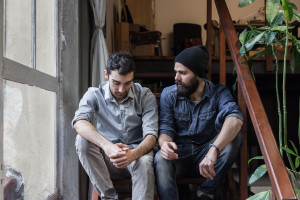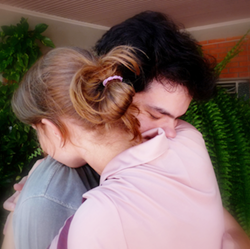Contributor: W. Travis Stewart, LPC, NCC writer for Addiction Hope
It is about as hard to absolve yourself of your own guilt as it is to sit in your own lap.
—Frederick Buechner
 The original title of this article was suggested as “A Peaceful Mind has No Guilt.” That is a wonderful ideal but an unreachable reality. What I want to suggest is that a mind at peace is one that knows how to find forgiveness and how to run back into its arms each time the weeds of self-condemnation wrap their prickly vines around our hearts and minds.
The original title of this article was suggested as “A Peaceful Mind has No Guilt.” That is a wonderful ideal but an unreachable reality. What I want to suggest is that a mind at peace is one that knows how to find forgiveness and how to run back into its arms each time the weeds of self-condemnation wrap their prickly vines around our hearts and minds.
Frederick Buechner, quoted above, has a much longer passage on guilt that is provocative and helpful, so much so that I was tempted to quote it in its entirety and call it an article. I won’t go so far as that but, I will cite several passages and share my own reflections.
When Guilt Has Too Much Power
The danger of our guilt, both personal and collective, is less that we won't take it to heart than that we'll take it to heart overmuch and let it fester there in ways that we ourselves often fail to recognize.
Buechner suggests that guilt can overpower us, not so much because we ignore it but, rather, because we submit to it beyond what it deserves. We fail to talk with others because we feel our sins are too much for them to forgive. We duck and hide from grace extended by others because we believe we deserve to be punished. Buechner comments, “The sense of our own inner brokenness estranges us from the very ones who could help patch us together again.”
The resolution is not to minimize guilt, but to accurately name our deeds and how we have harmed ourselves and others in a way that both speaks truth and opens the door to being known and loved by others.
 Guilt Sparks More Wrongdoing
Guilt Sparks More Wrongdoing
Wrongdoing sparks guilt sparks wrongdoing ad nauseam, and we all try to disguise the grim process from both ourselves and everybody else.
When we feel guilt it produces in us such emotional and relational rot that it isolates us from community and the light of reality that only the perspective of another can bring to us. This dark and dank place provides the conditions for more poor choices, wrong thinking and destructive actions. We can try to hide it but, when we like King David of Israel keep silent and carry our secret guilt alone, it feels like “our bones are wasting away.”
We Cannot Heal Ourselves From Guilt
It is about as hard to absolve yourself of your own guilt as it is to sit in your own lap.
Guilt feels like an intensely private affair. Oh, of course, the guilt of harm done to others is intensified when we are in the presence of the harmed, or even if we see a photo, hear a song, or have a memory sparked through a random daily experience. But the resolution to guilt feels like it entirely up to us. We ponder and suffer with it. We agonize and wallow in it. We might even lap it up like a dog returning to his own vomit.
There are those who speak of it often. We say they are full of self-hatred and we call them martyrs. Or whiners. They will speak of it but have nothing to do with your offer to absolve them. They believe it is up to them.
We believe it is up to us. In the end, if we really believe the solution to our guilt is up to us, it will become a self-fulfilling prophecy and we will be stuck with it forever.
We Need the Truth of Others to Free Us from Guilt
In order to break the circuit we need friends before whom we can put aside the disguise, trusting that when they see us for what we fully are, they won't run away screaming with, if nothing worse, laughter. Our trust in them leads us to trust their trust in us. In their presence the fact of our guilt no longer makes us feel and act out our guiltiness.
 The trusting embrace of an individual or community to whom we confess our wrongdoing frees us in two transformative ways, if we allow it.
The trusting embrace of an individual or community to whom we confess our wrongdoing frees us in two transformative ways, if we allow it.
First, many who confess the source of their guilt will find that what he or she feels they have done wrong, may not, in fact, have done any wrong. Many a person experiences this illegitimate guilt. A friend of mine regularly beat himself up over the slightest failures to be kind, selfless or, in a word, perfect. His guilt was a result of standards that were unattainable and insufferable.
Not long ago I pointed this out to him, saying, “Give yourself a break. Your expectations of yourself are beyond reality. Give yourself some space to be human.” He recently thanked me and mentioned how he has felt more at peace. He was able to receive my gift to him.
We need to hear from others who see us more accurately than we see ourselves and who can lift from our shoulders the false guilt we carry.
Second, we need others to speak to us their continued relationship and intimacy, even in the face of real harm we have done to them or others. We need others to say, “I see you and I’m still for you.” We need to believe that at least a few, trusted and safe individuals can embrace us for who we really are and not leave us.
This is how we find forgiveness. By bringing the truth of who we are to those who have the power to judge us but instead offer mercy and grace. And we need to go to them again and again and again.
Community Discussion – Share your thoughts here!
What has been your experience with finding peace when letting go of guilt?
About the author:
Travis Stewart earned a Master of Arts in Counseling (2001) and a Master of Arts in Theological Studies (2003), both from Covenant Seminary in St. Louis, MO. Travis is a Licensed Professional Counselor in the State of Missouri and a writer for Eating Disorder Hope and Addiction Hope.
The opinions and views of our guest contributors are shared to provide a broad perspective of addictions and co-occurring disorders. These are not necessarily the views of Addiction Hope, but an effort to offer a discussion of various issues by different concerned individuals. We at Addiction Hope understand that addictions result from a combination of environmental and genetic factors. If you or a loved one are suffering from an addiction, please know that there is hope for you, and seek immediate professional help.
Last Updated & Reviewed By: Jacquelyn Ekern, MS, LPC on October 9, 2015, 2015. Published on AddictionHope.com
